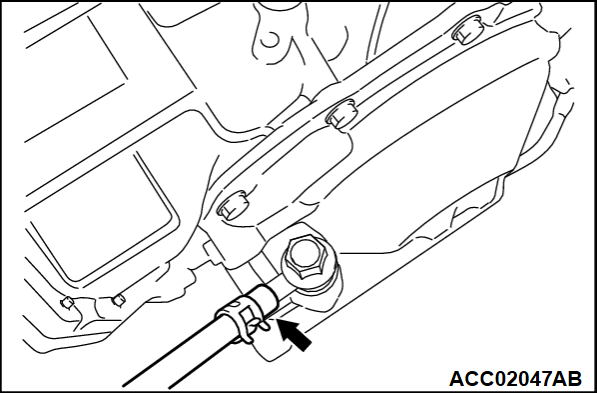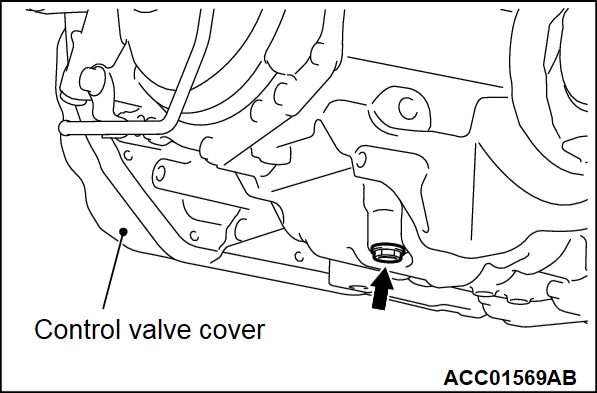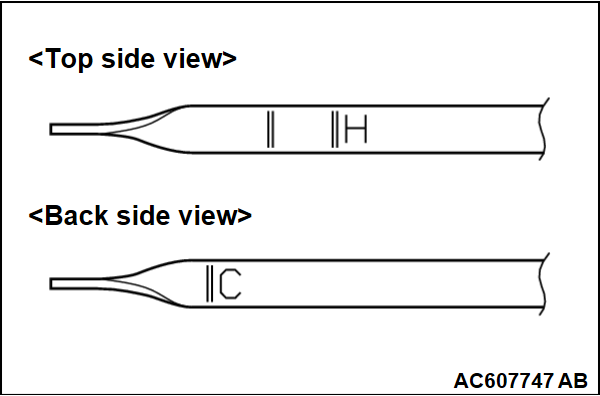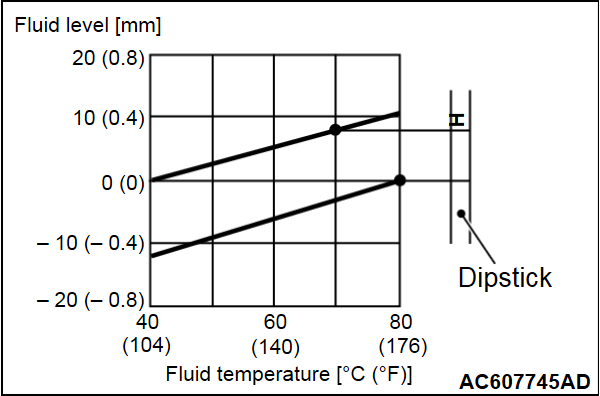TRANSMISSION FLUID CHANGE
If you have a transmission fluid changer, use this changer to replace the transmission fluid. If you do not have a transmission fluid changer, replace the transmission fluid by the following procedure.
1. Disconnect the hose shown in the illustration which connects the transaxle. Place a container under the hose to collect the discharge.
2.
| caution | The engine should be stopped within one minute after it is started. If all the transmission fluid has drained out before then, the engine should be stopped at that point. |
Start the engine and let the transmission fluid drain out.
(Running conditions: "N" range with engine idling)
Approximately 3.5 dm3 (3.7 quarts) of transmission fluid should be removed.
3. Remove the drain plug from the bottom of the transaxle case to drain the transmission fluid.
Approximately 2.0 dm3 (2.1 quarts) of transmission fluid should be removed.
4. Install the drain plug with a new gasket, and tighten it to the specified torque.
Tightening torque: 7.4 ± 2.4 N·m (65 ± 21 in-lb)
5.
| caution | Stop pouring if the full volume of transmission fluid can not be added. |
Add new transmission fluid (Mitsubishi Motors Genuine ATF-J3) through the oil filter tube.
Approximately 5.5 dm3 (5.8 quarts) of transmission fluid should be added.
6. Repeat the procedure in Step 2. (to pump out the rest of the contaminated transmission fluid)
7. Add new transmission fluid (Mitsubishi Motors Genuine ATF- J3) through the oil filter tube.
Approximately 3.5 dm3 (3.7 quarts) of transmission fluid should be added.
| note | Check for contamination or a burnt odor. If the transmission fluid is still contaminated or burnt, repeat Steps 6 and 7 before proceeding to Step 8. |
8. Reconnect the hose which was disconnected in step 1 above, and firmly insert the dipstick.
9. Start the engine and run it at idle for one to two minutes.
10. Move the selector lever through all positions, and then move it to the "N" position.
11. Check that the transmission fluid level is at the "C" mark on the dipstick. If the level is less than this, add transmission fluid.
12. Drive the vehicle until the transmission fluid temperature rises to the normal operating temperature [70 - 80°C (158 -176°C)], and then check the transmission fluid level again. The A/T fluid level must be at the "H" mark.
| note | The transmission fluid temperature is measured with Scan tool (M.U.T.-III). |
| note | The "C" level is for reference only; the "H" level should be regarded as the standard level. |
| note | If it takes some amount of time until the transmission fluid reaches its normal operating temperature [70 - 80°C (158 -176°C)], check the transmission fluid level by referring to the left diagram. |
13. When the transmission fluid is less than the specified level, add transmission fluid.
When the transmission fluid is greater than the specified level, drain the excess fluid through the drain plug to adjust the transmission fluid to the specified level.
14. Firmly insert the dipstick into the oil filler tube.
![[Previous]](../../../buttons/fprev.png)
![[Next]](../../../buttons/fnext.png)



